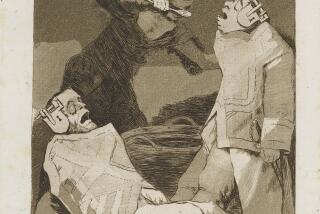Praunheim’s ‘Dolly’: Valentine to 3 Charmers
Rosa Von Praunheim’s 60-minute “Dolly, Lotte and Maria” (at the Nuart today) introduces us to three delightful and remarkable women who began as dancers and who fled Hitler’s Germany to make new lives in America. Petite, redheaded Dolly Haas was once a top UFA star, a radiant comedienne as well as a singer and dancer, who continued her career on stage in the United States but eventually became content with being the wife of theatrical caricaturist Al Hirschfeld.
Lotte Goslar, a celebrated comic mime as well as a dancer, continues to perform and for 10 years in the ‘40s and early ‘50s was a mainstay of the Turnabout Theater on La Cienega Boulevard. Maria-Ley Piscator, an elegant beauty in her 90s, led an incredibly romantic and glamorous life in Europe until she became the dedicated collaborator of her famed third husband, innovative playwright and man of the theater, Erwin Piscator.
Von Praunheim’s film is a valentine to these women, yet it’s as charming as they are and not at all sentimental. Playing with it is a reprise--not, as advertised, a premiere--of Richard Leacock and Susan Woll’s 51-minute 1984 “Lulu in Berlin,” a wonderful, incisive reminiscence with the brilliant and outspoken Louise Brooks, who recalls vividly her landmark collaboration with G. W. Pabst, “Pandora’s Box” and “Diary of a Lost Girl”--films that in Kenneth Tynan’s widely shared opinion made her the most seductive presence ever captured on celluloid.
Information: (213) 478-6379, 479-5269.
Among the films in “A Tribute to Anna Magnani,” which continues at UCLA’s Melnitz Theater this weekend, is Luchino Visconti’s “Bellissima” (1952), one of the finest films in both Magnani and Visconti’s careers. In the late director’s only feature-length comedy, Magnani stirs up plenty of her trademark bombast, yet there’s far more to her characterization of a stage mother than stereotype. There’s native wit and gentleness beneath the shouting and the familiar gestures. Magnani plays a Roman working-class housewife--perfectly sensible until she’s conned into believing that with the proper training her woebegone little daughter (Tina Apicella) can be turned into another Shirley Temple. There’s a Neorealist disillusionment to Visconti’s view of postwar Italy, but “Bellissima” (Saturday at 8 p.m.) is finally a paean to mother love, brought off magnificently by Magnani.
“Down with Wealth!” (1947), which screens Saturday at 6 p.m., offers Magnani as a naive, nouveau riche greengrocer who takes over the mansion of the aristocratic Vittorio De Sica, who is reduced to living in the basement. The way in which De Sica helps Magnani regain her senses has a subtlety and poignancy that lifts the film above the otherwise broadly comic and ordinary. Luigi Zampa’s “Deputy Angelina” (1947), which screens Sunday at 7:30 p.m., is fascinating as an example of how the Neorealist style with its social consciousness could be absorbed effectively within an actually quite conventional comedy-drama. Magnani plays a slum housewife and mother who inadvertently turns political activist.
Information: (213) 206-FILM, 206-8013.
The Academy of Motion Picture Arts and Sciences’ Contemporary Documentary series continues tonight at 8 at Melnitz Theater, UCLA, with Robert Le Donne’s calm yet shattering 23-minute “AIDS: The Story of Ken Meeks” (1986) and David Grubin’s 58-minute “The Wyeths: A Father and His Family” (1986). Produced for ABC’s “Nightline,” Le Donne’s documentary covers the last nine months in the life of Meeks, a New Jersey economics professor afflicted with AIDS. Meeks’ quiet heroism, matched by that of his lover and his parents, gives meaning to his death at 45. Ted Koppel’s questions to the dying Meeks are courageously direct.
Andrew Wyeth has long been hailed as America’s most beloved artist, but in Grubin’s warm account Wyeth shares the spotlight with his brother and three sisters as they recall their illustrator-father, N. C. Wyeth. The senior Wyeth was revered in his own time for his robust illustrations, primarily of children’s classics. The N. C. Wyeth who emerges in his children’s recollections and in a splendid array of clips from home movies, is a big, burly man, a life-force who loved his children as passionately as his art, but who grew melancholy over his own work before his tragic accidental death in 1945 at 63.
More to Read
The biggest entertainment stories
Get our big stories about Hollywood, film, television, music, arts, culture and more right in your inbox as soon as they publish.
You may occasionally receive promotional content from the Los Angeles Times.










